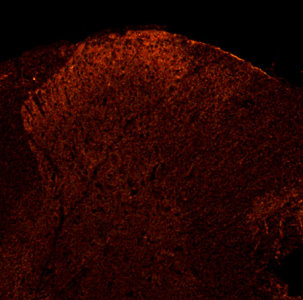"Where there's smoke there's fire" or in this study, where there's inflammation there is pain: Robert
P. Watson, Elliot Lilley, Moh Panesar, Gurdip Bhalay, Steven Langridge,
Shin-Shay Tian, Conor McClenaghan, Anna Ropenga, Fanning Zeng, Mark S. Nash.
Increased prokineticin 2 expression in gut inflammation: role in visceral pain
and intestinal ion transport. Neurogastroenterology & Motility. Volume
24, Issue 1, pages 65–e12, January 2012....Formalin-fixed,
wax-embedded tissues with no overt signs of pathology were purchased from
Asterand (Detroit, MI, USA); informed consent had been sought and received from
all donors. All tissues were used in accordance with the Human Tissue Act 2004
(UK)...guinea pig anti-TRPV1 antibody (GP14100 – Neuromics, Edina, MN, USA)...
Images: expression of prokineticin receptors in human and rat tissues. (A) Immunohistochemical analysis of PKR1 expression in the myenteric and submucosal ganglia of human stomach, ileum, and colon. Pkr1 (B) and Pkr2(C) expression in a range of human tissues determined using qRT-PCR. (D, E) Immunohistochemical of PKR1 distribution in rat DRG showing an absence of expression in large diameter, NF200 positive neurons (D), but co-expression with TRPV1 in presumptive nociceptive sensory neurons (E). (F) Distribution of Pkr2 mRNA by in situ hybridization in rat DRG. The IHC/ISH images shown are representative of the data obtained from n = 3 donors/animals.
Key Results Prok2 gene expression was up-regulated in biopsy samples from ulcerative colitis patients, and similar elevations were observed in rodent models of inflammatory colitis. Prokineticin receptor 1 (PKR1) was localized to the enteric neurons and extrinsic sensory neurons, whereas Pkr2 expression was restricted to sensory ganglia. In rats, PROK2-increased intracellular calcium levels in cultured enteric and dorsal root ganglia neurons, which was blocked by Compound 3. Moreover, PROK2 acting at prokineticin receptors stimulated intrinsic neuronally mediated ion transport in rat ileal mucosa. In vivo, Compound 3 reversed intracolonic mustard oil-induced referred allodynia and TNBS-induced visceral hypersensitivity, but not non-inflammatory, stress-induced visceral pain.
Check out our Pain and Inflammation Research Antibodies.
Scientists grow retina cells from skin-derived stem cells
-
WASHINGTON - University of Wisconsin-Madison researchers have successfully
grown multiple types of retina cells from two types of stem cells, giving
new ho...
16 years ago









